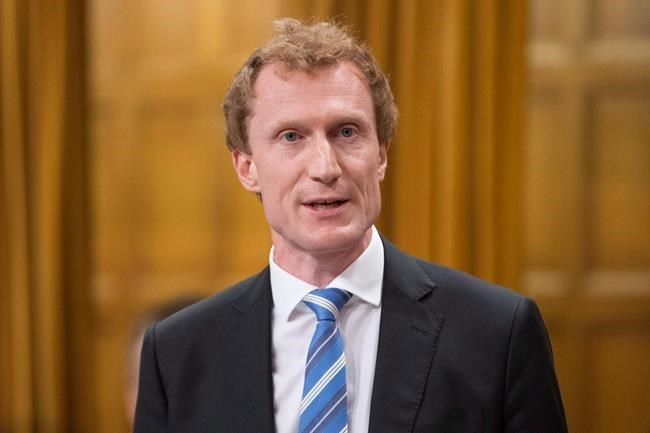
Speaking only in the Mohawk language Quebec Liberal MP Marc Miller delivers a statement prior to question period in the House of Commons in Ottawa on June 1, 2017. The federal parliamentary secretary of Crown-Indigenous Relations says Ottawa remains committed to resetting its relationship with Indigenous Peoples, and getting "out from under the Indian Act." At a summit on First Nations self-governance in Halifax, Marc Miller told delegates that the paternalistic constraints of the Indian Act lead directly to dependency, isolation and indignities. THE CANADIAN PRESS/Adrian Wyld
Republished November 28, 2018 - 12:49 PM
Original Publication Date November 28, 2018 - 8:26 AM
HALIFAX - Ottawa is committed to advancing the Mi’kmaw Nation and recognizing Indigenous Peoples' inherent right to self-determination, a key federal official told a First Nations self-governance summit in Halifax Wednesday.
Marc Miller, the parliamentary secretary to the federal Crown-Indigenous Relations minister, said treaty implementation and nation building starts with getting Indigenous Peoples "out from under the Indian Act."
"We know the paternalistic constraints of the Indian Act lead directly to dependency, isolation and indignities," he told hundreds of delegates.
"Those mistakes must not be repeated."
Prime Minister Justin Trudeau launched a national engagement process with Indigenous Peoples earlier this year.
A new legislative framework, to be developed in partnership with First Nations, Metis and Inuit, is intended to recognize and implement Indigenous rights and help tackle the many challenges facing Indigenous communities.
Miller said Ottawa has held over 100 engagement sessions with more than 1,700 Indigenous rights-holders.
He acknowledged the Assembly of First Nations has shared concerns about the timeline and the engagement activities, and says the federal government will work on addressing those concerns.
"Your insights are essential if we truly want to reset the relationship between the federal government and Indigenous Peoples," Miller said.
The Quebec MP said he recognizes that there is no pan-Indigenous approach to reconciliation, and that Ottawa will listen to the priorities of Indigenous Peoples in the Atlantic region and support the advancement of the Mi’kmaw Nation.
"It comes back to a recognition of your inherent rights to self-govern," Miller told hundreds of delegates at the summit.
"Self-determination isn't about giving government to Indigenous groups. It's about recognizing Indigenous governments and the rights that already exist, and have existed since time immemorial."
Miller, who garnered applause after opening his remarks in Mi'kmaq, quipped that he hoped his attempt at the Indigenous language "wouldn't set our relations back 10 or 15 years."
He added that Indigenous Peoples' control over their own education — in their own language — is "not only a right but an essential element of identity" and an important part of self-governance.
First Nations leaders from across Canada attended the regional summit on self-governance. The three-day event, which wraps up Thursday, is focused on finding a pathway to nationhood for Indigenous Peoples in the Atlantic region known as Mi'kma'ki.
The second day of the summit featured a panel with three former Assembly of First Nations national chiefs: Ovide Mercredi, Matthew Coon Come and Georges Erasmus.
The Indigenous leaders spoke of their struggles to establish sovereignty for their people and a path forward for the Atlantic region.
Erasmus noted that Indigenous Peoples have been strongly influenced by the Indian Act for more than a hundred years.
He said First Nations in the Atlantic region have the opportunity to rethink what their governance structure should be.
"We all had our own system of governance before," he said, noting that elements of the past that are still relevant could be reintroduced.
Meanwhile, Mercredi said the Assembly of First Nations should help Indigenous communities re-establish nationhood.
"It should be proactive in terms of the development of laws — not with Canada, but with our people. It needs to redirect its focus away from giving advice to Canada, to giving advice to our people."
News from © The Canadian Press, 2018